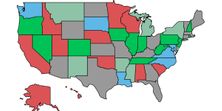Massachusetts’ long-stalled sports betting bill has missed another chance to move forward.
The House Ways and Means committee excluded sports betting revenues from its upcoming fiscal year budget draft, signaling lawmakers’ expectations that legal wagering won’t begin in the next 18 months. This preliminary move early on in the budget process doesn’t mean sports betting’s 2021 legalization hopes are already over, but it’s the latest indication the state’s years-long impasse is no closer to resolution.
Massachusetts Sports Betting Background
Republican Gov. Charlie Baker and bipartisan members of the Democratic-controlled legislature have floated dozens of sports betting legalization bills in the three years since the Supreme Court struck down the federal wagering ban. None have gained serious traction.
Massachusetts policymakers have had to weigh a myriad of growing and influential gaming interests, starting with the nation’s most lucrative per capita state lottery and continuing with the more recent launch of full-scale commercial casino resorts. Just as casino operators fought for access in the region’s most populated state, so too have sportsbooks.
In addition to the potential financial windfall, several top national sportsbook brands have additional tangible and intangible interest in Massachusetts;
- DraftKings: The Boston-based daily fantasy sports operator-turned sportsbook giant would undoubtedly fight to keep market preeminence in its home state. The company pays a national-high 51 percent of gross gaming revenue to neighboring New Hampshire in exchange for a market monopoly.
- FanDuel: DraftKings’ New York-based arch-rival would not take another Northeastern market shutout lightly.
- Penn National: The company’s Barstool Sports brand, led by native son Dave Portnoy, rose to national prominence from Massachusetts headquarters. The company’s Plainridge Park harness race track and slot parlor also gives it a brick-and-mortar foothold.
- MGM: Since opening its Springfield casino just feet from the Professional Basketball Hall of Fame several years ago, MGM has aggressively expanded its BetMGM app in nearly every possible market since. It would undoubtedly look to grow its already sizeable Massachusetts casino investment with a retail and digital sportsbook.
- Wynn: Encore Boston Harbor seeks to be the most prominent gaming option in the region’s most populated metropolis. Its newly launched WynnBet app would be another piece of that mission.
These factors add higher stakes to the already massive interest operators such as PointsBet, Caesars/William Hill or virtually any other company would have in the market.
Massachusetts has higher-than-average household incomes and education levels, both factors that positively correlate with sports betting interest. That, plus some of the nation’s most iconic and beloved professional sports teams, creates one of the most coveted potential U.S. markets.
Notably, Massachusetts’ most prominent universities oppose college betting in a state where many still remember the Boston College point-shaving scandal of the late 1970’s. Though industry stakeholders argue college betting prohibitions just fuel the black market, college betting remains another contention point helping to stall the bill.
What Comes Next
The budget advanced through the Ways and Means Committee Thursday and now goes to a full House floor vote later this month. From there, the bill goes through the same process in the Senate, then a bicameral conference committee that resolves the two chamber’s differences and finally on to Baker’s desk. Officials can add sports betting revenue projections at any point in this months-long process, and House Speaker Ron Mariano told MassLive there’s still hope sports betting is included before the budget even passes onto the Senate.
That doesn’t mean it’s a sure bet. Lawmakers have not included sports betting in any previous final budget so far, and many of the aforementioned issues that tanked its inclusion remain ahead for the upcoming fiscal year that begins this summer. Even if included in the budget, lawmakers still must pass legislation laying out all the myriad regulations, licensing structures, taxes and other key aspects of a legal sports betting market.
That requires a thus far unreachable framework that appeases both policymakers and the sportsbooks. Not only do these heavily financially and emotionally invested operators want access, they also want to keep as many competitors out as possible, creating a persistent logistical quagmire.
There are plenty of remaining opportunities to breakthrough this political logjam, but one more chance to advance sports betting legalization has already passed.


